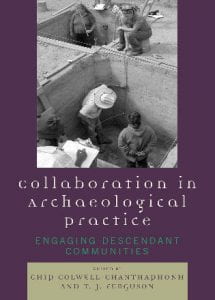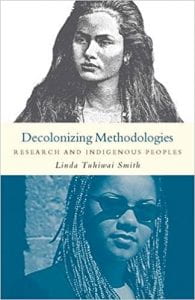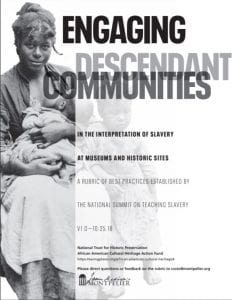
Collaborating in Archaeological Practice by Chip Colwell-Chanthaphohn and T.J. Ferguson
There is a commonly known phrase that states that history is written by the victors. In the case of archaeology, history is written by the research which in many cases is someone outside of the culture being researched. Many times, especially in European archaeological investigations, archaeologists are studying ancient civilizations that are no longer in existence. However, in the United States (and across the Americas) archaeologists investigate the cultures and ancestors of living descendant communities. Early American archaeologists were Western antiquarians who collected artifacts and researched monuments and graves in order to discover the history of their newly claimed lands. The public wanted their new home to have a similar historical depth to it as their former European homes. This research often involved excavating of graves and looting the grave good and human remains. Thomas Jefferson, the father of American Archaeology, investigated the mounds near his home to discover who actually constructed them. While this investigation did conclude that ancestors of the present Native Americans were the builders, he completely ignored the importance of the mounds to the current population. He claims to have seen tribes gathered around the mounds but then continues to excavate what appears to be child graves without any concern for the tribe’s feelings.
That lack of interest in descendant communities’ cultures, feelings, ideals, and practices relating to the archaeological sites continued until the 1960s when indigenous communities began to protest sites and archaeology. Because of these efforts, there are now laws that require consultation with Native American tribes throughout the archaeological process and enforce respect for their beliefs especially in regard to burials. Unfortunately, these laws only go so far, and the histories of these descendant communities are still interpreted from a Western point of view. While some people may argue that modern archaeologists attempt to interpret their finds without that Western bias, this is just not possible. Interpretations are directly influenced but experience, culture, and ideals in which the individual lives. With that in mind, those most qualified to interpret history is those whose history is being interpreted, meaning that indigenous people should be interpreting indigenous archaeology. However, because archaeology is dominated by the European ethic groups who colonized the Americas, it is not possible for only those of the same background as the research subjects to interpret their material culture. This idea also perpetuated the idea that only certain people can study certain subjects.
The best way to combat the colonization of archaeology, is not to simply consult with indigenous populations but to directly involve them in the research. Indigenous populations (and other descendant communities) should ask and influence research questions, guide the excavations, determine what can and cannot be excavated, and play large roles in the dissemination of information. Participatory research also prevents the descendants from being and feeling like purely test subjects rather than active players in their own history. They have the opportunity to answer their own questions, not just accept the answers to other people’s questions. In the end the people who are the least bias toward history are those who are descendant from that history. While this post has a focus on indigenous communities, participatory archaeology can be done or all descendant communities throughout the Americas and the world.
This is a tall order that will take a lot of effort to accomplish. Not every individual in a descendant community will be active or responsive to archaeology regardless of their inclusion. By also involving them in the public aspect, more individuals, both descendant and non-, may gain a new perspective and appreciation for the history in their own backyard.
Follow IUP Archaeology on Facebook, Instagram, and Twitter
Sources:
Atalay, Sonya
2006 Indigenous Archaeology as Decolonizing Practice. American Indian Quarterly Special Issue Decolonizing Archaeology 30(3/4): 280-310


[…] gevonden. Daar zit geen perspectief aan vast.” Niks is minder waar. In de Amerikaanse blogpost “Decolonization of Archaeology” van Rachael Smith wordt dit heel duidelijk uiteengezet voor wat betreft de Amerikaanse archeologie. […]
[…] to that.” Nothing could be further from the truth. Rachael Smith’s American blog post Decolonization of Archaeology explains this very clearly as far as American archaeology is concerned. She describes […]